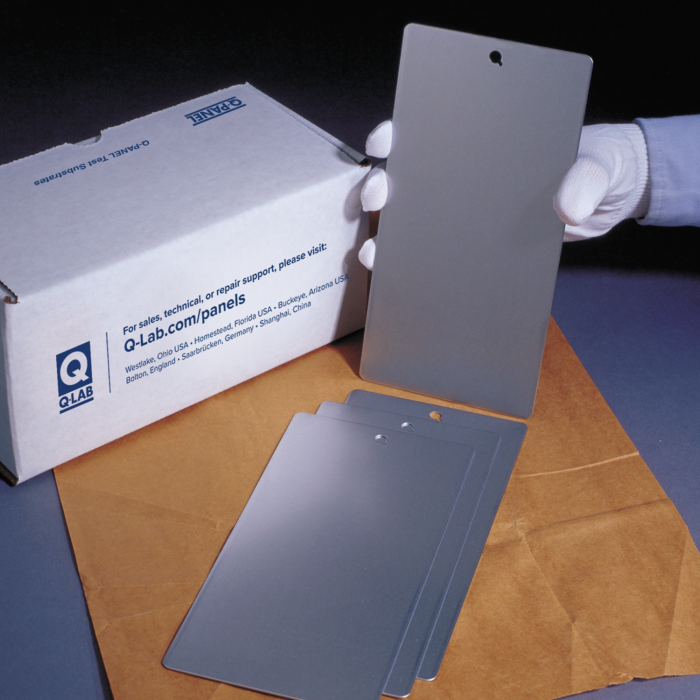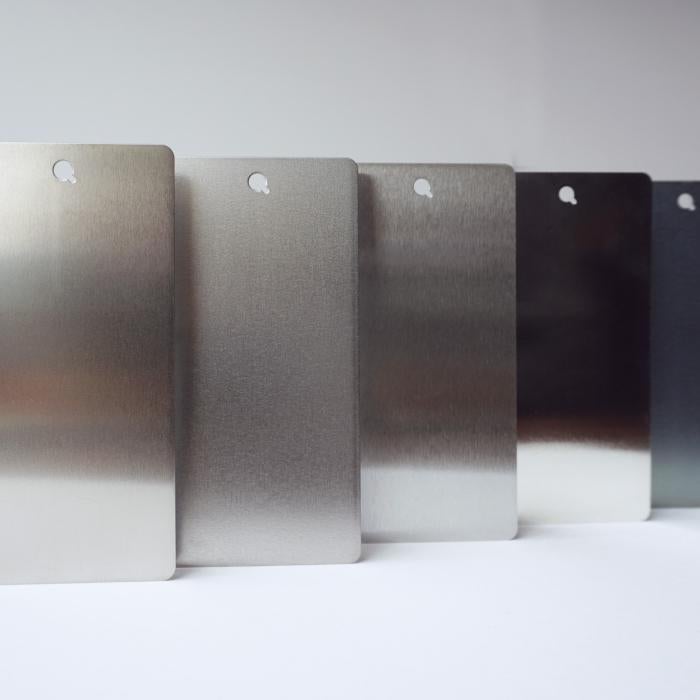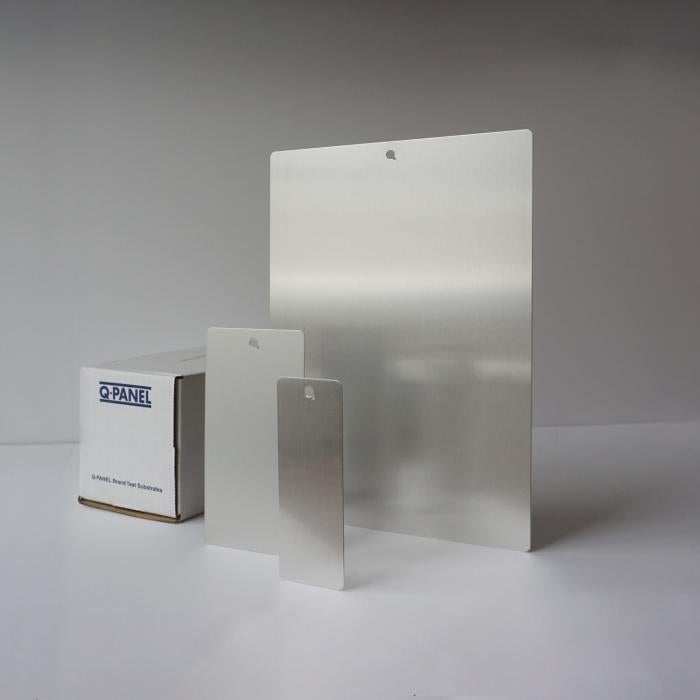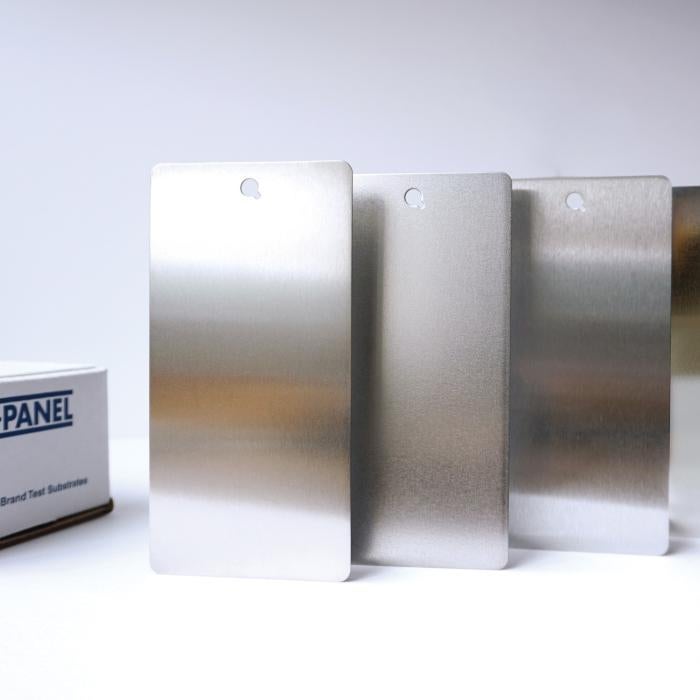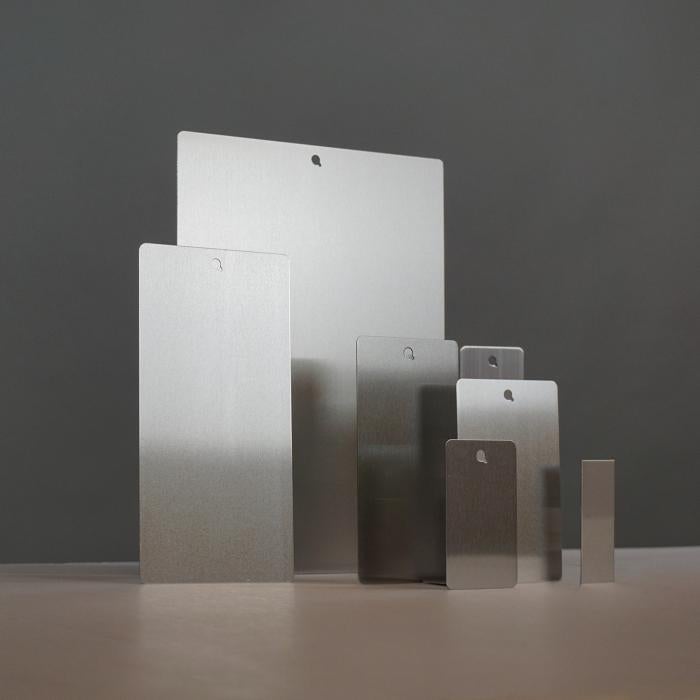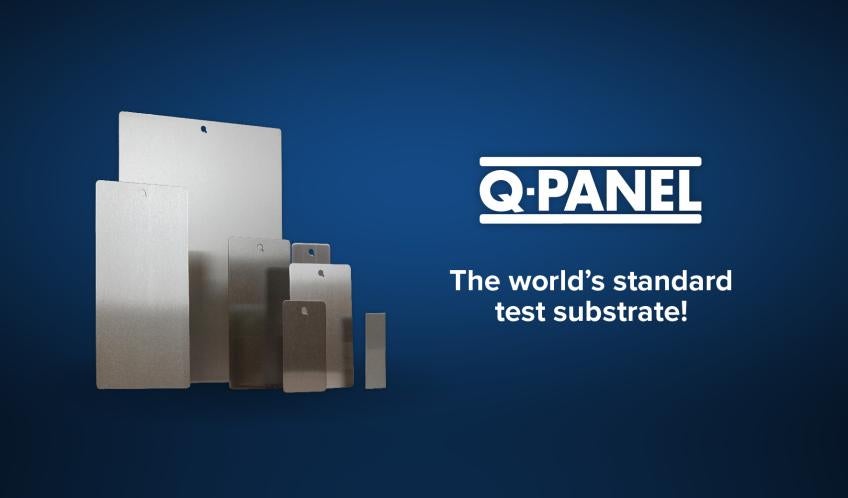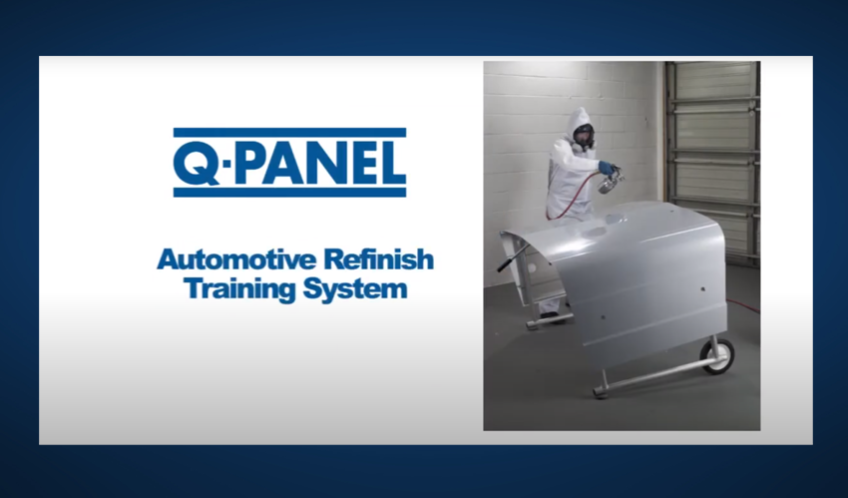Q-PANEL Steel Substrates
Q-PANEL® steel test substrates from Q-Lab minimize metal variability as a source of bias in critical tests. Made from standard low-carbon, cold-rolled steel, they are clean, consistent, convenient, and economical. A wide range of panel sizes and types are available for immediate shipment from stock. Panels are stored completely clean and, in most cases, can be used right out of the box.
Minimizing Variability in Coatings Testing
For coatings tests to be reliable and reproducible, they must be performed on a substrate that is consistent from test to test. Unfortunately, ordinary commercial steel displays wide variations in the surface properties that affect the bonding of coatings. This is due to variations in surface texture, cleanliness, and chemistry. The result is that ordinary steel is unsuitable for many coatings tests. See Steel: The Problem of a Standardized Surface for details.
Q-PANEL steel test substrates from Q-Lab address this issue by minimizing metal variability as a source of bias in critical paint, coating, and adhesion tests. For over 60 years, Q-PANEL steel and aluminum test substrates have been recognized as the world standard for a consistent and uniform test surface for paints, plating, adhesives, sealants, rust inhibitors and other coatings.
Thousands of labs around the world use millions of our steel test panels every year for color development, weathering exposures, salt spray and corrosion testing, physical properties testing, and quality control. A wide range of panel sizes and types are available for immediate shipment from stock - see Q-PANEL Steel Specifications Bulletin for a complete list.
Clean
The Q-PANEL production process thoroughly cleans panels and removes any oil from the surface. Special handling assures that all panels are completely clean when they are packaged. Steel panels are packed in plastic bags in quantities of 20 to 50 panels (depending on type and thickness), with a vapor phase rust inhibitor inside a sturdy cardboard carton, for a shelf life of several years.
Consistent
Three factors assure Q-PANEL substrates are consistent, high-quality, and low-cost:
- Volume metal purchasing from selected mills
- Automated production on a high-speed line
- Rigorous inspection at several processing stages
Convenient
Panels are supplied pre-cleaned, with a 6 mm (¼”) Q-shaped hole (it’s our trademark and your assurance of quality). For safety and ease of handling, the panels have rounded corners and deburred edges. Our inventory of over a million paint test panels means that 95% of our orders are shipped from stock. In most cases, panels can be used right out of the box.
Economical
Because of Q-Lab’s high-volume production, Q-PANEL substrates cost less than you might expect for a standardized surface. Purchasing clean, safe, standardized panels reduces the time lab personnel must spend cleaning and handling panels.
Use our Q-PANEL Selector guide to browse our extensive list of standard panels and request information on a custom panel, or contact us to get a quote.
Sample Pack Kit
For customers who may not know exactly what panel they need, or who just want to have a sample to touch and feel, we offer inexpensive steel, aluminum, and lap shear sample packs. Each pack will contain five of our most popular bare, treated, and specialty steel and aluminum panels.
General Purpose Steel Q-PANEL Substrates
These types of Q-PANEL substrates are usually the best choice for most tests for paints, coatings, and rust inhibitors. They are our most widely-used and most economical types of panels, and are stocked in the greatest variety of sizes and finishes. See our Q-PANEL Steel Specifications Bulletin and Q-PANEL Brochure for more information, or browse our selection of General Purpose steel panels.
Mill Finish (Smooth and Matte)
- Type D is the most economical steel Q-PANEL, the best buy for many general applications. It has a very smooth, bright mill finish and is recommended for testing gloss and color. Type D panels are very thin and flexible, at 0.25 mm (0.010 in).
- Type QD has the same smooth surface and composition as Type D, and is 0.51 mm (0.020 in) thick.
- Type R panels have a dull matte mill finish, representative of general-purpose sheet metal applications. Because they are thicker, 0.81 mm (0.032 in), Type R panels are more rigid than Type QD.
Ground (Polished) Finish
- Type S panels are the same steel as Type R, with a thickness of 0.81 mm (0.032 in). One side is ground to remove the mill surface and produce a smooth, “brushed” finish. This surface frequently gives better adhesion results than a matte finish.
Iron Phosphated Pre-treated Steel
- Type R-XX-I and Type S-XX-I are Type R and S panels treated with Bonderite M-FE 1000™, the most commonly used type of industrial iron phosphate. These panels also use a chrome seal, Bonderite M-PT 60.
- Type R-XX-ICF and Type S-XX-ICF have the same steel and iron phosphate treatment as the (–I) Q-PANEL substrates, but instead use a REACH/RoHS-compliant chrome-free seal (-ICF), Bonderite M-PT 99X.
Painted
These Q-PANEL substrates are pre-coated to eliminate the time required to prime test substrates. They are also available with black stripes and other patterns to test the hiding power of a coating. They are 102 ×
- Type WW panels are similar in color to white automotive primer
- Type GW panels are similar in color to gray automotive primer
- Type WWS panels use the same white primer as Type WW, plus a black stripe, Type WWS panels are especially useful for hiding power tests
Specialty Steel Q-PANEL Substrates
Q-Lab produces a wide variety of panels to meet as many testing needs as possible. Special use Q-PANEL substrates are designed to meet a particular test standard, or for a particular limited application. They will often be more expensive than similarly-sized General Purpose panels. The available sizes and finishes of these are limited and they may not be available from stock. See our Q-PANEL Steel Specifications Bulletin and Q-PANEL Brochure for more information, or browse our selection of Specialty steel panels.
Tinplate
- Type DT panels are the same steel and size as Type D, but with a tin-plated surface. These panels are useful for testing coatings that will be applied over tinplate in actual service. Tin plating is also required for certain legacy government standards.
Low-Alloy Steel
- Type HA panels are made from AISI 4130 steel, which contains molybdenum and chromium as strengthening agents. These panels are 1 mm (0.040 in) thick. HA panels meet AMS 6350/6351 standard. Type HA panels do not have a Q-shaped hole.
- Type HN panels are made from the same steel and are the same size as Type HA. Type HN panels meet AMS 6345 and have a 1/8” mm hole.
Stainless Steel
- Type SS panels are made from 304 stainless steel and are 0.89 mm (0.035 in) thick, and do not have a Q-shaped hole. SS-13-N panels are popular for some lap shear testing for adhesion.
Taber Abraser Panels
Type S-44-T and R-44-T panels are specially designed for use with the Taber Abraser Tester.
- Type S-44-T panels are 102 × 102 mm (4 × 4 in) panels with a hole punched in the middle for mounting on the turntable of a Taber Abraser. They have the same steel and thickness as Type S panels.
- Type R-44-T panels are also designed for use with a Taber Abraser. They have the same steel, finish, and thickness as Type R panels.
Adhesive Panels (Ground Finish)
“Adhesive” testing is performed to see how strong a particular adhesive is in terms of gluing two surfaces together. This is not to be confused with “adhesion” testing, which evaluates how well a paint film sticks to the underlying substrate.
- Type RS panels use heavy-gauge 25 × 101 mm (1 × 4 in) steel and are designed for lap shear testing of adhesives in a tensile tester.
Automotive Styling
These large panels have compound curves and a horizontal crease to simulate car doors. Coatings applied to styling panels reflect light in a manner similar to a coating on an actual automobile side panel. Panels are available in an uncoated, matte steel finish. They are an economical way for the coating designer to show how the coating looks on a large complex surface.
- Type SPR automotive styling panels are made from uncoated, matte steel.
Curved Panels
Any Q-PANEL steel substrate between 76-152 mm (3-6 in) width can be ordered through a custom order.
Q-PANEL Steel Specifications Bulletin
Click here to view translated documents.
Document Library
Browse Q-Lab’s extensive library of Q-PANEL testing literature and technical content.
Education
Check out blogs, case studies, articles, and webinars to build your knowledge of weathering testing.
Standards
Review setup and performance information on key international and OEM test standards from ASTM, ISO, SAE, JIS, GB, and more.
